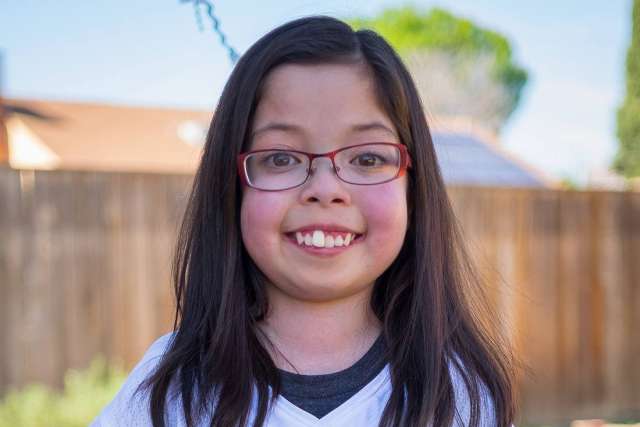Noah Bella Michaelis spent 13 years living with health challenges from being born with complex congenital heart defects (CHD) and heterotaxy syndrome. The syndrome involves an abnormal arrangement of internal organs in the chest and abdomen. On January 3, 2017, Noah succumbed to a life-threatening condition she developed, known as plastic bronchitis.
“Noah was unlike anyone I’ve ever known before,” says Cecile Michaelis, Noah’s mother. “Over a period of two years we were at the hospital up to three times a week for eight-hour days of infusions. Not once did she complain. She just knew she couldn’t focus her energy there.”
Instead, Noah chose to give back to other families and children with similar experiences. From 2010 until her passing, Noah raised $100,000 for the Hopeful Hearts Foundation through the “Noah’s Festival of Life” celebration and lemonade stands.
“When Noah died, I wanted to crawl into a hole and never come out,” says Cecile. “I wondered, ‘What can we do for the rest of our lives?’" I knew giving helped Noah cope and decided we could honor her by also making it our mission to give.”
Cecile and her husband Keith, Noah’s father, started the Live Like Noah Foundation to help create awareness about CHD and to raise funds for CHD-related causes.
Plastic bronchitis: a heart surgery complication
Plastic bronchitis is a life-threatening disorder that occurs in 5 to 10 percent of patients following the Fontan procedure, a heart surgery to correct single-ventricle heart defects. It occurs when lymph fluid builds up and creates rubbery plugs known as casts in the airways. The casts block airways and make breathing difficult, which can lead to respiratory failure.
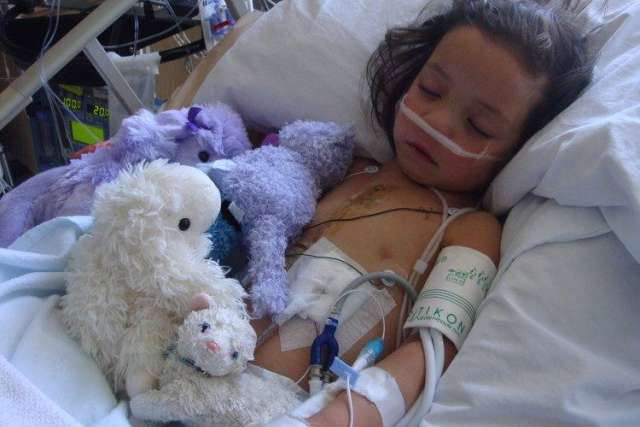
“Even during times when Noah was relatively healthy, she always had this cough. We called it Noah’s heart cough,” says Keith. “It was like she needed to clear out her lungs. In August of 2016, she coughed up something foreign that wasn’t phlegm, it looked like a bronchial branch from her lung.”
Noah had coughed up an intact cast. Her parents immediately texted Noah’s doctor, pediatric cardiologist Daniel S. Levi, MD, with a photo asking, “What is this?”
“Seeing this was Dr. Levi’s greatest fear because he knew UCLA couldn’t treat Noah’s plastic bronchitis,” says Keith. At the time, Children’s Hospital of Philadelphia (CHOP) was the only center in the world with the expertise and a minimally invasive procedure to treat the rare condition.
In December 2016, Cecile, Keith and Noah flew from Los Angeles to Philadelphia for treatment. A five- to six-hour flight with a child in vulnerable health is challenging. The family had to ensure they had portable oxygen and an extra battery to ensure they could make the entire flight.
But perhaps the hardest part about going to Philadelphia was leaving Noah’s care team. “Our family had developed such a strong, trusting relationship with Dr. Levi and the pediatric cardiology team at UCLA,” says Cecile. “It was hard to say goodbye and put our faith in a new team.”
Noah never left CHOP. While the procedure for plastic bronchitis was successful — her parents say Noah felt amazed at how well she could breathe — her body wasn’t strong enough to endure complications of recovery.
So when it came time for Cecile to ask, “What can we do for the rest of our lives?” she knew part of her mission would be giving back to the newly established Pediatric Lymphatic Intervention Program at UCLA Mattel Children’s Hospital.
Pediatric lymphatic intervention program at UCLA takes shape
Cecile and Keith worked tirelessly to create the Hike for Noah campaign. They pulled together friends and supporters with strong social networks to raise funds for the lymphatic program.
The Michaelis’ efforts culminated in a 16-mile hike on February 23, 2019 (16 miles because Noah would have turned 16 this year). The event raised more than $20,000 for the new program. On April 9, they presented the check to Dr. Levi and his team, who will use the funds for training.
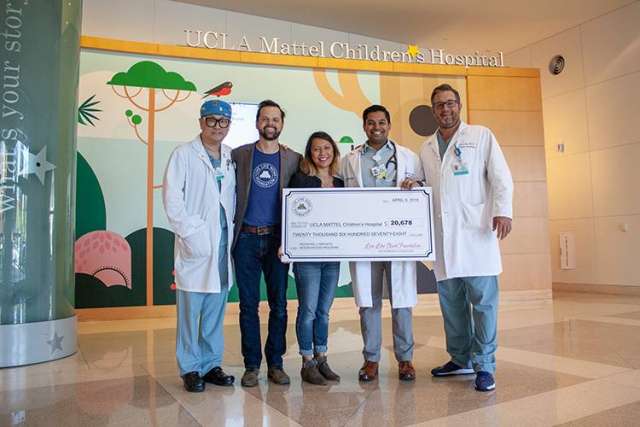
“With the support from the Live Like Noah Foundation, we are building a lymphatic program on the West Coast similar to the established program in Philadelphia. We hope that children like Noah can access care much closer to their homes,” says Dr. Levi. “The same doctors that treated Noah in Philadelphia are helping us establish the program at UCLA.”
By establishing the lymphatic program, Dr. Levi feels he is honoring Noah and the many other children who lost their lives to CHD, plastic bronchitis or complications.
“Noah was a really amazing girl," says UCLA pediatric cardiologist Daniel Levi, MD. "Everyone who met her fell in love with her. She was full of life and through the Festival of Life, she did something meaningful for other kids with heart problems. Our lymphatic program is a way of continuing her efforts.”
Foundation raises awareness for CHD
The Live Like Noah Foundation is intentional in honoring Noah, right down to every detail. The foundation’s logo includes the geometric image of a moth — a critter Noah had a connection with.
“Noah was a nature lover and always felt the moth was something people looked down upon,” says Cecile. “She didn’t like that people thought of moths as ugly butterflies because she thought they had inner beauty. I suspect she saw herself in the moth. She knew she was different and had physical differences from kids who didn’t have heart problems.”
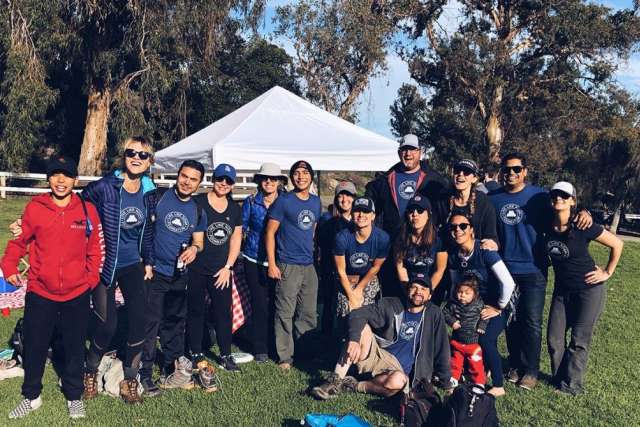
“Another lovely parallel is that moths always look for the light when they are in darkness. In Noah’s darkest times — and she had quite a few — she always looked for the light at the end of the tunnel and focused on that instead of dwelling on the negative.”
The Live Like Noah Foundation has plans for future fundraising events, probably another hike. They also want to create opportunities for parents to connect with others who have similar experiences.
“So often you feel alone in the process of raising a child with CHD. It’s not a visible disease so it’s hard to find other parents with shared experiences,” says Keith. “When you do get to interact with others who get it, you’re able to laugh at some of the crazy things you do on a daily basis. It’s a bonding experience.”
In addition to raising funds for the UCLA program, the foundation seeks to raise awareness for CHD and to advocate for additional research funding. Although advancements in treatment and care have improved dramatically, CHD research is still grossly underfunded.
The healing power of giving back
While running the foundation, Cecile and Keith are also chasing a toddler. Cecile was seven months pregnant when Noah passed away. Noah named her brother Henry after the lead character in the Boxcar Children books, who was resourceful and protective.
She would read to Henry in his mother’s belly and tell her parents, “He’s going to be so different from me. He’ll never want to listen, and he’ll go nonstop.” According to Cecile, Noah was spot on.
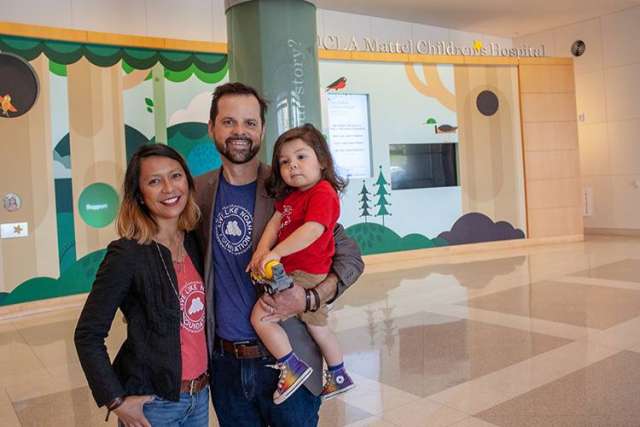
Another thing Noah right about all along was the power of giving.
You can learn more about the Live Like Noah Foundation and read Noah’s Story on the foundation’s website.
“I can’t tell you how healing it’s been,” says Keith. “I feel her pushing us and telling us that we need to keep talking about CHD and giving back. Noah chose to be vocal. We don’t want her voice to be silenced just because she’s no longer here.”
If you’d like to honor Noah, please consider donating to the pediatric lymphatic program at UCLA (select In Memory: Noah Michaelis on the Gift Review screen)
